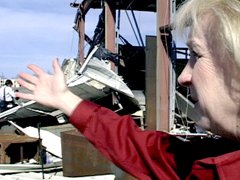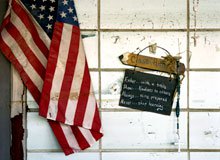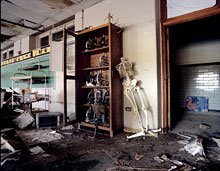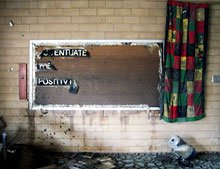Hard Times in the Big Easy: Putting the Pieces Back Together After Hurricane Katrina
A full academic year after the storm hit, New Orleans has a grand plan to remake its battered schools. Making it a reality will take unity and money, two commodities rare in this fabled city.
Your content has been saved!
Go to My Saved Content.
The New Orleans public school system was a study in everything wrong with the Big Easy -- cronyism, corruption, incompetence, complacency -- long before Hurricane Katrina blew the town off its foundation last August. Now, the renewal of public education in New Orleans might be the best barometer of the health of this fabled city, and its ability to recover from the devastating blow.
So far, the prognosis is not good.
By spring, only 25 of the 128 public schools operating before the hurricane were open; 40 in the New Orleans Public Schools alone were substantially damaged and aren't expected to be up and running by next year. Katrina also obliterated the district's tax base, often leaving state and private funding for charter schools as the only way to reopen classrooms; 18 of the 25 schools that have reopened were charter schools. Meanwhile, the student population plunged from a pre-Katrina enrollment of 62,665 to a meager 11,000 pupils.

According to a report of the Education Committee of Big Easy mayor Ray Nagin's Bring New Orleans Back Commission, an estimated $1 billion is needed from the Federal Emergency Management Administration (FEMA) to repair and rebuild the schools left standing. The school district, meanwhile, was $370 million in debt as of late April, racking up another $1.5 million a week paying salaries to storm-furloughed teachers and staff. Making matters worse, owing to substandard academic performance, the state had control of the fate of 107 of the district's schools.
But by spring there was also a plan to pull New Orleans public education out of Katrina's muck.
The proposal, developed by the commission's education committee, could also serve as a wish list of the best practices and noblest goals for all public education. It envisions a highly networked model where student input is valued, principals have real power, and a single governing body works to ensure universal prekindergarten, superior academic standards, and financial accountability.
The problem?
How about money? Or how about New Orleans's long tradition of divisive politics, inept leadership, and poor financial and academic performance? "Education is the single most important thing that will determine the future of New Orleans," says Joseph Canizaro, a prominent local developer and founder and co-chairman of the Committee for a Better New Orleans. "But if it is the same old, same old business as usual, parents will not come back. And those that are already here will not stay."

A CEO/CFO in Every School
No one knows that better than Scott Cowen, president of Tulane University and chairman of the commission's Education Committee. Saddled with the task of rebuilding the university (see "At Your Public Service"), Cowen accepted the position for one reason: If New Orleans doesn't come back, Tulane's future is scotched as well. "If this plan doesn't happen, what will happen to New Orleans is anyone's guess," Cowen says. "This is our chance to show the citizens of Louisiana -- and, indeed, the country -- that we're committed to working together to put politics aside for the sake of our children."
Cowen's committee vies to circumvent the city's penchant for politicking by shifting financial control and decision making away from the ineffectual school district to the schools themselves. Under its proposal, state and local educators would set academic standards, but principals would become the chief executive officers and chief financial officers of their schools, with financial and staffing oversight.
Cowen calls the idea the plan's centerpiece, despite the fact that administrators face significant training hurdles. "Principals will be faced with a lot of stuff they know nothing about," admits Bob Riley, a member of Cowen's advisory council and co-chair of the Greater New Orleans Education Foundation. "We'll need to provide professional development to educate them."
Beyond that, the plan calls for an ambitious citywide prekindergarten program. It proposes a system run on a network model, in which state, charter, and district schools are governed by a lean implementation body not unlike a corporate board of directors. The commission would be responsible for governing and accountability but not day-today execution.
The proposal also suggests a combination of service providers and shared internal functions to curb expenses, streamline delivery, and equitably direct resources across schools. Previously, few back-office functions (those relating to the inner workings of a business or institution) existed in many schools. In addition, the plan mandates that top educational and management talent be sought and hired, and it emphasizes the need for community and parental input so the culture of New Orleans is preserved.
"Cowen's plan is a good one," says Cecil Picard, the state superintendent of education. "But this will be a five- to seven-year journey."
That journey began when 18 schools, mostly charter schools, reopened in January. The school district ran 5, and another 3 were operated by the state under the so-called Recovery District. That entity, created nine years ago, was expanded in November, when Picard took over 102 of New Orleans's worst-performing schools (in addition to the 5 already under his control). The expansion was prompted by an amendment to the state's Recovery School District Law and backed by frequently updated reports delivered to Picard by Bill Roberti, a turnaround specialist with management consultancy Alvarez & Marsal. (Last summer, after realizing the district could not account for $71 million in federal funds, the state education department hired Roberti to overhaul New Orleans's woeful finances.)
Roberti says he found a "financial system so bad that it had a gigantic impact on the quality of education." Says Picard, "That's when I decided to do something about the academic crisis. I took over the schools."

A Vision, Flat Broke
Thus, the fate of New Orleans schools has fallen into many hands. Joining independent charter groups and the Algiers Charter Schools Association, which controls four elementary schools in the city, are Cowen's committee, the Recovery District, the school district, and the state's Board of Elementary and Secondary Education. "The top priority is to get decision makers at all levels aligned behind implementation of the plan," Cowen says. "Without formal cooperation and coordination, we'll squander this unique opportunity to give our children the education they deserve."
Unfortunately, that's going to be tough. The sad fact is that New Orleans had little significant business environment before the storm, so there isn't a corporate base to tap into for money or resources now. Some local businesses, including the McIlhenny Co., maker of Tabasco Sauce, and the cuisine-and-kitchen-ware empire of celebrity chef Emeril Lagasse, have stepped up, but the only Fortune 500 company in New Orleans before Katrina was Entergy, the local utility. Entergy filed for bankruptcy soon after the hurricane, though, because no one was paying utility bills (they weren't at home) and due to the catastrophic physical damage to the city's electric grid.
If anyone can make this incredibly difficult situation work, however, it's the affable Cowen, without question one of the beleaguered city's most unshakable leaders. But even he will find it tough going. Picard, for one, isn't about to turn over Recovery District schools anytime soon. "New Orleans will not get control of its schools until we have the finances straight and we have good academics," he says.
In addition, a vocal subset of parents and members of some charter associations want an all-charter system in New Orleans. "Our plan is different than some in the state wanted," says Bob Riley of Cowen's advisory council. "But we felt that an all-charter system would mean that we would end up with a balkanized school system." Getting disparate groups to buy into the Cowen plan will take a monumental effort, admits IBM executive and Education Committee member David Waller. "People in education here did not have good relationships in the past," Waller says. "It is going to take hard work and dialogue to keep all the parties engaged in our vision."

Paying for that vision is not going to be easy, either, whatever it costs. Cowen's group has not put a price tag on the project, because it just doesn't know -- even now -- which parts of the plan will be implemented, how many kids will come back, and which schools will be rebuilt. The system is still in triage mode -- and will be, at the very least, throughout the summer. Picard has until the beginning of June to submit his report, which may include parts of the committee's recommendations, to the state Legislature. FEMA has pledged 100 percent financing for rebuilding, but that step will bring schools only to their sorry pre-Katrina state.
And because -- thanks to the breathtakingly slow pace of FEMA recovery efforts -- more than half of the city's population still lacks housing, taxes to fund the plan are spare. According to consultant Bill Roberti, the district got $110 million in property tax revenues before the hurricane, but estimates are that post-Katrina income from that tax will be just $47 million. Sales tax revenues have likewise shrunk by more than half, to $42 million, and state per-pupil support has dwindled similarly, to $96 million. "Somebody," Roberti says wryly, "is going to have to get very creative."
The most creative thinking thus far is the tantalizing prospect that corporate money will rain down on the struggling district. Cisco Systems, a manufacturer of computer-networking equipment based in San Jose, California, has pledged $20 million in technical gear and expertise to Louisiana schools (and an equal amount to Mississippi) through its 21st Century Schools Education Initiative (see "Big Biz, Big Bucks"), and BellSouth has committed $5 million.
Another $40 million has flowed into the treasury of Foundations for Recovery, an arm of the Baton Rouge Area Foundation. Among the contributors are Coca-Cola, Johnson & Johnson, and chemical manufacturer BASF, as well McIlhenny and Lagasse. "To be honest, right now, if it weren't for the corporate money, there would not be a lot happening," says Jan Melton, executive director of another local nonprofit, the Academic Distinction Fund. "The feds are just not here."

But Melton is in Baton Rouge, which suffered minimal hurricane damage; its most significant exposure to Katrina was a staggering influx of evacuees. Such locales make it easier for corporations to demonstrably show their largesse. According to William Fowler, executive director of the Cisco program, his team's efforts are so far directed at areas "that are getting past the effects of the hurricane." To date, this coverage is limited to Jefferson Parish, an immediate neighbor of New Orleans; Cisco has yet to venture into the more destitute New Orleans school district. After all, schools with leaky roofs and moldy walls aren't the best places to showcase souped-up Internet-router capabilities.
Picard, who ultimately must ask state and federal legislators to pick up the tab for rebuilding New Orleans schools, is deservedly skeptical about corporate donors. "Katrina forced us to step outside the box," the state superintendent of schools says, "but we do not solicit private funds." Still, he concedes that "the schools can't do it alone anymore. Maybe it is time to open the doors and invite the corporations in."
Nancy Rutter Clark, a freelance writer based in Atherton, California, was a resident of New Orleans until August 29, 2005.
SIDEBAR: Big Biz, Big Bucks

Corporate revenue may reach only a few.
When Katrina ripped through Mississippi's Gulf Coast, the region's schools were already in a world of hurt. The state was ranked forty-seventh in per pupil spending, nearly one-third of its population lived in poverty, and 80 percent of public school kids in many areas were on a free-lunch or reduced-price-lunch program.
Click here to read the rest of this article.
SIDEBAR: At Your Public Service
Tulane University has staked its future on the likes of Sarah "Sally" Baker. The effervescent nineteen-year-old college freshman from Ogdensburg, New York, considers rebuilding New Orleans an "obligation." After spending her first semester as a Tulanian at Syracuse University -- enrollees scattered when Tulane was closed for the fall 2005 semester -- Baker returned to New Orleans in January and was promptly elected chair of community service for her dorm. Now the public health major organizes community projects for about half of the 250 students living there. The projects are voluntary, but Baker says, "if you're apathetic, you don't belong here. If public service discourages students from coming to Tulane, they are not our kind."